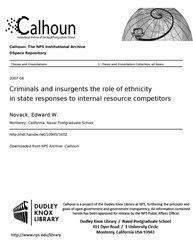File:Criminals and insurgents the role of ethnicity in state responses to internal resource competitors (IA criminalsndinsur109453402).pdf

Original file (1,275 × 1,650 pixels, file size: 1.04 MB, MIME type: application/pdf, 130 pages)
Captions
Captions
Summary[edit]
| Criminals and insurgents the role of ethnicity in state responses to internal resource competitors
( |
||
|---|---|---|
| Author |
Novack, Edward W. |
|
| Title |
Criminals and insurgents the role of ethnicity in state responses to internal resource competitors |
|
| Publisher |
Monterey, California. Naval Postgraduate School |
|
| Description |
A government facing an ethnicity based insurgency competing with it for natural resources faces different threats based upon the level of ethnic homogeneity of the insurgent elements. Where a mono-ethnic insurgent threat develops, the government faces a potential separatist movement seeking secession from the country as a means to address its grievances. The government will have no option other than counterinsurgency to manage this threat. Where a multi-ethnic insurgent threat develops, the threat of separatism may be thwarted due to the disparate nature of the insurgent elements and the tendency of these groups to compete with each other. In this scenario, the government has the ability to \"criminalize\" the insurgents, thereby enabling the government to justify safeguarding its resources while taking minimal steps to resolve the grievances of the communities. An examination of the approaches taken by Indonesia and Nigeria in addressing their insurgencies in Aceh and the Niger Delta respectively is illustrative of the advantages and drawbacks of these approaches. In the end it is shown that counterinsurgency is more difficult though decisive, while criminalization ultimately risks the creation of a new ethnic identity born of economic hardship, around which an ethnic nationalist movement might vie for secession. Subjects: Insurgency |
|
| Language | English | |
| Publication date | June 2007 | |
| Current location |
IA Collections: navalpostgraduateschoollibrary; fedlink |
|
| Accession number |
criminalsndinsur109453402 |
|
| Source | ||
| Permission (Reusing this file) |
This publication is a work of the U.S. Government as defined in Title 17, United States Code, Section 101. As such, it is in the public domain, and under the provisions of Title 17, United States Code, Section 105, is not copyrighted in the U.S. | |
Licensing[edit]
| Public domainPublic domainfalsefalse |
This work is in the public domain in the United States because it is a work prepared by an officer or employee of the United States Government as part of that person’s official duties under the terms of Title 17, Chapter 1, Section 105 of the US Code.
Note: This only applies to original works of the Federal Government and not to the work of any individual U.S. state, territory, commonwealth, county, municipality, or any other subdivision. This template also does not apply to postage stamp designs published by the United States Postal Service since 1978. (See § 313.6(C)(1) of Compendium of U.S. Copyright Office Practices). It also does not apply to certain US coins; see The US Mint Terms of Use.
|
 | |
| This file has been identified as being free of known restrictions under copyright law, including all related and neighboring rights. | ||
https://creativecommons.org/publicdomain/mark/1.0/PDMCreative Commons Public Domain Mark 1.0falsefalse
File history
Click on a date/time to view the file as it appeared at that time.
| Date/Time | Thumbnail | Dimensions | User | Comment | |
|---|---|---|---|---|---|
| current | 10:14, 16 July 2020 |  | 1,275 × 1,650, 130 pages (1.04 MB) | Fæ (talk | contribs) | FEDLINK - United States Federal Collection criminalsndinsur109453402 (User talk:Fæ/IA books#Fork8) (batch 1993-2020 #12661) |
You cannot overwrite this file.
File usage on Commons
The following page uses this file:
Metadata
This file contains additional information such as Exif metadata which may have been added by the digital camera, scanner, or software program used to create or digitize it. If the file has been modified from its original state, some details such as the timestamp may not fully reflect those of the original file. The timestamp is only as accurate as the clock in the camera, and it may be completely wrong.
| Short title | Criminals and insurgents the role of ethnicity in state responses to internal resource competitors |
|---|---|
| Author | Novack, Edward W. |
| Software used | Novack, Edward W. |
| Conversion program | Acrobat Distiller 7.0.5 (Windows) |
| Encrypted | no |
| Page size | 612 x 792 pts (letter) |
| Version of PDF format | 1.4 |

